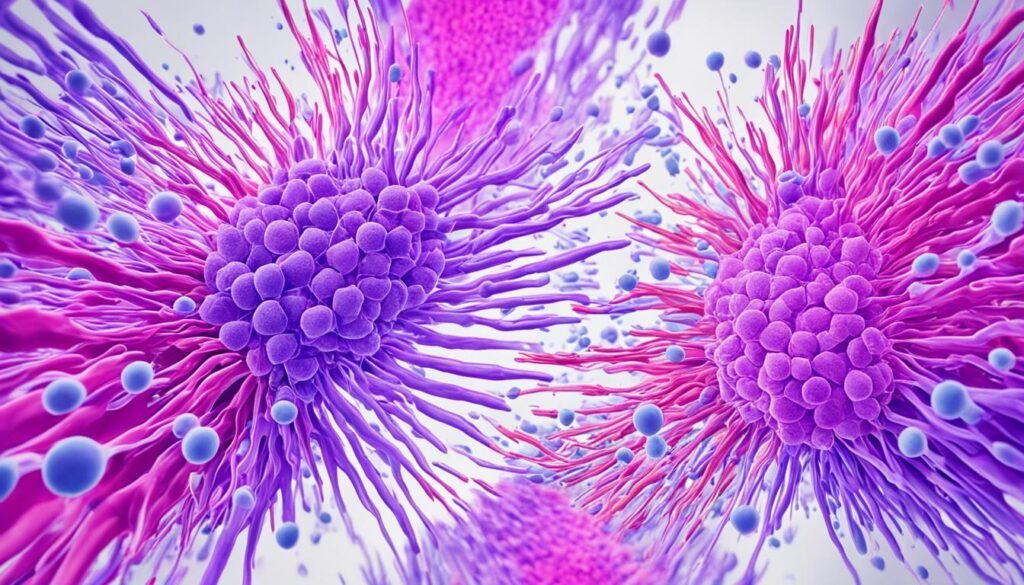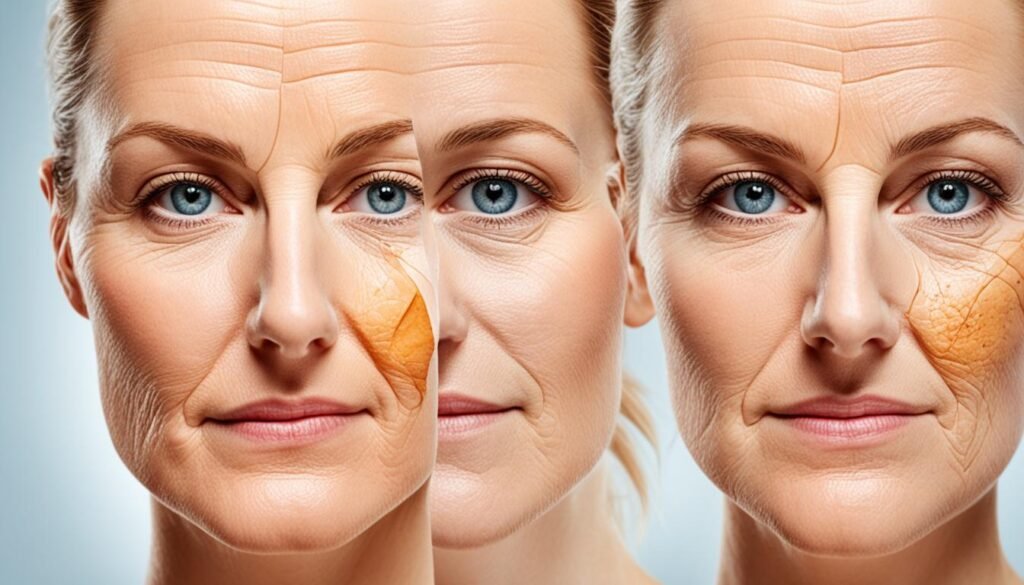Did you know that stress can impact the production of collagen, the essential protein responsible for maintaining the integrity and elasticity of our skin? It’s true! Research has shown that stress can influence collagen synthesis and degradation, leading to skin health issues. In this article, we will delve into the relationship between stress and collagen production, exploring the effects of stress on skin collagen and uncovering strategies to support collagen synthesis in times of stress.
Key Takeaways:
- Stress can affect the production and degradation of collagen in the skin.
- Collagen plays a crucial role in maintaining the integrity and elasticity of the skin.
- Glucocorticoids released during stress can interfere with collagen synthesis.
- Chronic stress can lead to collagen degradation and premature aging of the skin.
- Supplementing with collagen and supporting a healthy lifestyle can mitigate the effects of stress on collagen production.
The Role of Collagen in Skin Health
Collagen plays a crucial role in maintaining the integrity and elasticity of the skin. It provides structural support, helping the skin maintain its smooth and plump appearance. Collagen, the most abundant protein in the body, is responsible for giving the skin its strength and firmness.
Collagen is found in the extracellular matrix, a complex network of proteins and molecules that support skin cells. It acts as a scaffold, providing the framework for new skin cells to grow and develop. Collagen fibers are intertwined, forming a strong and flexible mesh that gives the skin its elasticity.
The importance of collagen in skin health cannot be overstated. It helps the skin resist stretching, reducing the formation of wrinkles and fine lines. Collagen also promotes skin hydration by attracting and retaining moisture, giving the skin a youthful and supple appearance.
As we age, collagen production naturally declines, resulting in thinner and less elastic skin. Factors such as UV radiation, pollution, and smoking can further accelerate collagen degradation. The loss of collagen leads to sagging skin, wrinkles, and a dull complexion.
To maintain and improve skin health, it is crucial to support collagen production. This can be done through a combination of dietary choices, skincare products, and lifestyle habits.
The Importance of Collagen in Skin Integrity
Collagen is essential for maintaining the integrity of the skin. It acts as a structural support, preventing the skin from sagging and losing its shape. Collagen fibers provide tensile strength and elasticity, allowing the skin to stretch and bounce back to its original form.
When collagen levels decline, the skin becomes weaker and more prone to damage. It loses its ability to withstand stress and loses its firmness. This can result in the formation of wrinkles, fine lines, and sagging skin.
By promoting collagen production, we can help maintain the integrity and resilience of the skin. This can be achieved through various methods, including a nutrient-rich diet, regular exercise, and the use of collagen-boosting skincare products.
The Importance of Collagen in Skin Elasticity
Elasticity is an essential characteristic of healthy skin. It refers to the skin’s ability to stretch and return to its original form without sagging or wrinkling. Collagen is a key player in maintaining skin elasticity.
Collagen fibers provide structure to the skin, allowing it to stretch and contract. As we age, collagen fibers become weaker and less abundant, leading to a loss of elasticity. Skin becomes less capable of bouncing back, resulting in sagging and the formation of wrinkles.
Collagen production promotes skin elasticity by replenishing the collagen fibers and supporting the skin’s natural ability to stretch and contract. This helps to reduce the appearance of wrinkles and maintain a youthful and firm complexion.
| Benefits of Collagen in Skin Health | How to Support Collagen Production |
|---|---|
|
|
By prioritizing collagen production and taking steps to support skin health, you can maintain a youthful, firm, and elastic complexion.
The Impact of Stress on Collagen Synthesis
Stress is known to have significant effects on collagen synthesis, which plays a crucial role in maintaining the health and appearance of the skin. One of the key factors involved in this process is the release of glucocorticoids, which are stress hormones that can interfere with collagen production.
Glucocorticoids have been found to inhibit the body’s ability to produce collagen, leading to reduced collagen levels in the skin. This can result in a loss of elasticity and firmness, contributing to the development of fine lines and wrinkles. Moreover, stress-induced collagen degradation further exacerbates the impact on collagen production and overall skin health.
Research suggests that high-stress states result in lower collagen production. During periods of stress, the body allocates its resources to combat stress and inflammation, diverting energy away from collagen synthesis. This imbalance can have long-term consequences on skin integrity and contribute to premature aging.
It is important to note that the effects of stress on collagen synthesis can vary from person to person, as individuals may react differently to stress-related factors. However, maintaining a healthy lifestyle and implementing stress-management techniques can help mitigate the negative impact of stress on collagen production and preserve skin health.
Next, we will explore the relationship between stress and skin health to understand the broader implications and effects on different skin types.
The Relationship Between Stress and Skin Health

Stress can have various effects on skin health. In individuals prone to acne, stress can trigger breakouts due to increased oil production and inflammation. For those with sensitive skin, stress can exacerbate existing skin conditions and lead to inflammation and rashes. Additionally, stress-induced inflammation can further impact collagen production, compromising overall skin health.
The release of stress hormones, such as cortisol, can stimulate the sebaceous glands to produce more oil, leading to clogged pores and acne breakouts. This increased oil production, combined with inflammation in the skin, creates an environment conducive to the development of acne.
Research suggests that stress-induced inflammation can disrupt the skin’s barrier function and compromise its ability to retain moisture, making it more susceptible to external irritants and allergens. This can result in heightened sensitivity and the development of inflammatory skin conditions.
Additionally, stress can disrupt the delicate balance of the immune system, triggering an overactive response that further contributes to skin inflammation. The inflammatory cascade can lead to redness, swelling, and itching, exacerbating existing skin conditions in individuals with sensitive skin.
Moreover, chronic stress can impair the body’s ability to repair and regenerate collagen, which is essential for maintaining skin elasticity and firmness. The increased production of stress hormones, inflammation, and oxidative stress can all contribute to a reduction in collagen synthesis, leading to premature aging and the appearance of fine lines and wrinkles.
Chronic Stress and Collagen Degradation
Prolonged exposure to chronic stress, such as during a global pandemic, can have detrimental effects on collagen levels in the body. Chronic stress induces various physiological changes that contribute to collagen degradation and compromise overall skin health. One of the key mechanisms through which chronic stress affects collagen is by increasing oxidative stress and promoting inflammation.
Oxidative stress occurs when there is an imbalance between reactive oxygen species (ROS) and the body’s antioxidant defenses. The increased production of ROS during chronic stress can lead to collagen breakdown and impair collagen synthesis. This oxidative damage can result in premature aging and the appearance of fine lines and wrinkles.
Chronic stress increases ROS production, leading to collagen degradation and compromised skin health. The oxidative stress-induced collagen damage can cause premature aging and the formation of fine lines and wrinkles.
Furthermore, chronic stress triggers the release of stress hormones, such as cortisol, which can further impact collagen levels. Cortisol promotes collagen breakdown and inhibits collagen synthesis, contributing to the gradual deterioration of skin elasticity and firmness.
Research has also shown that prolonged exposure to chronic stress can disrupt the balance between collagen production and degradation, shifting the equilibrium towards collagen breakdown. This imbalance can result in reduced collagen synthesis over time, leading to a decline in collagen levels and compromised skin health.
| Effects of Chronic Stress on Collagen | Effects on Skin Health |
|---|---|
| Promotes oxidative stress | Contributes to collagen degradation and premature aging |
| Increases inflammation | Impairs collagen synthesis and compromises skin elasticity |
| Elevates cortisol levels | Promotes collagen breakdown and inhibits collagen production |
| Disrupts collagen balance | Leads to reduced collagen synthesis and compromised skin health |
It is important to recognize the long-term effects of chronic stress on collagen and take steps to mitigate its impact. Implementing stress management techniques, adopting a healthy lifestyle, and incorporating collagen-supporting supplements can help maintain collagen levels and support overall skin health, even during stressful periods.
Supporting Collagen Production in Times of Stress

While it may be challenging to control stress levels, there are ways to support collagen production during stressful periods.
One effective method is to incorporate collagen supplements into your daily routine. These supplements have been scientifically shown to promote collagen and elastin production, improve moisture levels, and reduce the appearance of fine lines.
Collagen supplements, especially those containing hydrolyzed collagen, can provide the essential building blocks for collagen synthesis. Hydrolyzed collagen undergoes a process that breaks it down into smaller peptides, making it easier for the body to absorb and utilize.
This form of collagen supplementation supports the skin’s natural ability to produce collagen, helping to counteract the effects of stress-induced collagen loss.
By including collagen supplements in your routine during times of stress, you can provide the support your skin needs to maintain its vibrancy and elasticity.
The Benefits of Hydrolyzed Collagen:
Hydrolyzed collagen offers numerous benefits for the skin, including:
- Increased collagen and elastin production
- Improved moisture retention
- Reduced appearance of fine lines and wrinkles
- Enhanced skin elasticity
These benefits can help your skin stay resilient and youthful-looking, even during periods of stress.
Table: Comparison of Collagen Supplement Effects
| Standard Collagen Supplement | Hydrolyzed Collagen Supplement | |
|---|---|---|
| Absorption | May have lower absorption rate due to larger collagen molecules. | Higher absorption rate due to smaller peptides that are easily assimilated by the body. |
| Benefits | Promotes collagen production and supports skin health. | Promotes collagen production, improves moisture levels, reduces fine lines, and supports skin elasticity. |
| Recommended Usage | Typically taken as capsules or tablets. | Available in various forms such as powders, liquids, and capsules. |
| Convenience | May require larger doses for desired effects. | Lower doses often provide significant benefits. |
As shown in the table above, hydrolyzed collagen supplements offer distinct advantages over standard collagen supplements in terms of absorption, specific benefits, recommended usage, and convenience.
By choosing a hydrolyzed collagen supplement, you can optimize the support for collagen synthesis and combat stress-induced collagen loss more effectively.
The Importance of Vitamin C in Collagen Production
Vitamin C plays a crucial role in the production of collagen, the protein responsible for maintaining the skin’s structure and elasticity. It is an essential nutrient that our bodies cannot produce on their own, so obtaining an adequate amount through diet or supplementation is vital.
Not only does vitamin C stimulate collagen synthesis, but it also acts as a potent antioxidant, protecting collagen fibers from oxidative damage caused by free radicals. By neutralizing these harmful molecules, vitamin C helps maintain the integrity and stability of collagen, ensuring its optimal function in the skin.
Research has shown that vitamin C can stabilize collagen by promoting the cross-linking of collagen fibers, enhancing its resilience and preventing premature breakdown. This stabilizing effect contributes to improved skin texture, firmness, and overall youthfulness.
When it comes to collagen production, vitamin C works hand in hand with other essential nutrients, such as amino acids and minerals, to provide the building blocks necessary for collagen synthesis. By supplying the body with these essential components, vitamin C supports the production of new collagen fibers, helping to replace damaged or degraded ones.
It’s important to note that vitamin C’s benefits for collagen production extend beyond the skin. Collagen is also vital for the health of our joints, bones, and blood vessels. By supporting collagen synthesis, vitamin C contributes to overall wellness and the proper functioning of various bodily systems.
To ensure optimal collagen production and maintenance, it is recommended to incorporate vitamin C-rich foods into your diet, such as citrus fruits, strawberries, kiwi, and bell peppers. Additionally, vitamin C supplements can be a convenient way to boost your intake, especially during times of stress or when dietary sources are limited.
In conclusion, vitamin C plays a crucial role in collagen production and stability. Its antioxidant effects protect collagen fibers from damage, while its role in cross-linking and providing essential building blocks contributes to healthy collagen synthesis. By incorporating vitamin C into your skincare routine and overall lifestyle, you can support the production of this vital protein and maintain youthful, resilient skin.
Hyaluronic Acid and Moisture Retention

Hyaluronic acid plays a vital role in maintaining skin hydration and moisture levels. It is a natural substance found in the skin that has the remarkable ability to retain water, providing that plump and supple appearance. When combined with collagen, hyaluronic acid works synergistically to support overall skin health and vitality.
Supplementing with hyaluronic acid can have significant benefits for collagen production and skin moisture. By increasing hyaluronic acid levels in the body, you can enhance the skin’s ability to retain moisture, resulting in enhanced hydration and a smoother complexion.
Hyaluronic acid acts as a humectant, attracting and holding onto moisture from the environment. This moisture-binding property helps to replenish and restore the skin’s moisture barrier, preventing dryness and dehydration. By maintaining optimal moisture levels, hyaluronic acid helps to improve skin elasticity, reduce the appearance of fine lines and wrinkles, and promote a more youthful complexion.
Research has shown that hyaluronic acid supplementation can support collagen synthesis, leading to improved skin health. Collagen, as we know, is essential for maintaining the skin’s structure and firmness. By supporting collagen production, hyaluronic acid contributes to smoother, plumper, and more resilient skin.
Hyaluronic Acid Benefits:
- Enhanced skin hydration
- Improved moisture retention
- Reduced appearance of fine lines and wrinkles
- Increased skin elasticity
- Enhanced collagen production
“Hyaluronic acid plays a crucial role in maintaining the skin’s moisture balance and promoting a youthful appearance. Supplementing with hyaluronic acid can boost collagen production and improve skin hydration, resulting in healthier, more radiant skin.”
| Benefits of Hyaluronic Acid | Effects on Skin |
|---|---|
| Enhances skin hydration | Prevents dryness and dehydration |
| Improves moisture retention | Maintains optimal moisture levels |
| Reduces appearance of fine lines and wrinkles | Provides a smoother and more youthful complexion |
| Increases skin elasticity | Enhances firmness and suppleness |
| Supports collagen production | Contributes to healthier and more resilient skin |
By incorporating hyaluronic acid supplementation into your skincare routine, you can optimize collagen production and achieve a more hydrated and youthful complexion. Make sure to consult with a skincare professional or dermatologist to determine the most suitable hyaluronic acid product for your skin.
The Role of Corticotropin-Releasing Hormone (CRH)

Corticotropin-releasing hormone (CRH) plays a significant role in the intricate relationship between stress and collagen production. This hormone is involved in triggering both collagen degradation and skin inflammation, which directly impact collagen synthesis. Research has shown that CRH stimulates fibroblasts, the cells responsible for collagen and elastin production, highlighting its crucial role in modulating collagen levels during periods of stress.
| Effects of CRH in Collagen Production | Impact on Skin Health |
|---|---|
| Collagen Degradation | Skin Inflammation |
| CRH can trigger the breakdown of collagen molecules, leading to reduced collagen levels in the skin. | CRH-induced skin inflammation can contribute to collagen degradation and compromise overall skin health. |
| Collagen Synthesis | |
| CRH can interfere with collagen synthesis, affecting the body’s ability to produce adequate collagen. |
Understanding the role of CRH in collagen production is essential in comprehending how stress impacts skin health. By addressing the mechanisms through which CRH influences collagen levels, researchers can develop strategies to mitigate the negative effects of stress on collagen synthesis and promote healthier skin.
The Effects of Stress on Different Skin Types

Stress can have varying effects on the skin, depending on an individual’s skin type and condition. Here, we explore how stress impacts acne-prone and sensitive skin, as well as other stress-induced skin conditions.
Stress and Acne-Prone Skin
For individuals with acne-prone skin, stress can exacerbate breakouts and contribute to their frequency and severity. When the body is under stress, it releases hormones such as cortisol, which can increase oil production in the skin. Excess oil, combined with a buildup of dead skin cells, can clog pores and lead to the development of acne. Stress-related inflammation can also worsen existing acne lesions.
Stress and Sensitive Skin
Stress can have a profound impact on individuals with sensitive skin. Stress hormones can trigger inflammation and weaken the skin’s natural barrier function, making it more susceptible to irritation and itching. This can lead to the development of rashes, redness, and other skin sensitivities. The heightened sensitivity caused by stress can also make the skin more reactive to skincare products and environmental factors.
Stress-Induced Skin Conditions
In addition to acne and sensitivity, stress can contribute to various other skin conditions. Stress-induced skin conditions can manifest as eczema flare-ups, psoriasis outbreaks, rosacea flare-ups, hives, and even hair loss. The exact mechanisms through which stress triggers these conditions are still being studied, but it is believed that stress hormones and inflammation play significant roles.
Expert Insight:
“Emerging evidence suggests that stress-induced inflammation can disrupt the natural balance of the skin, triggering or exacerbating various skin conditions. By implementing stress management techniques and adopting a personalized skincare routine, individuals can better manage these stress-induced skin conditions.”
Understanding the specific effects of stress on different skin types is crucial for developing effective skincare regimens and managing skin conditions. By prioritizing stress management and adopting a skincare routine tailored to their skin type, individuals can help mitigate the impact of stress on their skin and promote overall skin health.
| Skin Type | Effects of Stress |
|---|---|
| Acne-Prone Skin | Increased breakouts and inflammation |
| Sensitive Skin | Inflammation, redness, and heightened sensitivity |
| Eczema-Prone Skin | Flare-ups and increased itching |
| Psoriasis-Prone Skin | Increased frequency and severity of outbreaks |
| Rosacea-Prone Skin | Flare-ups and increased redness |
| Skin Allergies | Heightened sensitivity and increased allergy-related symptoms |
| Hair and Scalp | Hair loss, scalp inflammation, and imbalances |
Conclusion
In conclusion, stress has a profound impact on collagen production, a vital component for maintaining healthy skin. The release of glucocorticoids during periods of stress disrupts collagen synthesis, resulting in decreased collagen levels and compromised skin health. Moreover, chronic stress and oxidative stress contribute to collagen degradation and premature aging.
However, there are measures that can be taken to support collagen production and mitigate the effects of stress on the skin. Supplementation with collagen and hyaluronic acid has shown promising results in promoting collagen synthesis, improving moisture retention, and enhancing overall skin health. Additionally, adopting a healthy lifestyle that includes stress management techniques, proper nutrition, and regular exercise can also support collagen production.
Understanding the relationship between stress and collagen production is crucial for maintaining optimal skin health. By addressing the effects of stress on collagen synthesis and employing strategies to support collagen production, individuals can minimize the negative impact of stress on their skin and achieve vibrant, youthful-looking skin for years to come.
FAQ
How does stress affect collagen production?
Stress triggers the release of glucocorticoids, which interfere with collagen synthesis and lead to reduced collagen levels in the skin. Stress can also induce collagen degradation, further compromising collagen production and skin health.
What effects can stress have on skin health?
Stress can trigger acne breakouts, increase oil production, and cause inflammation in individuals prone to acne. For those with sensitive skin, stress can exacerbate skin conditions and lead to inflammation and rashes. Stress-induced inflammation can also impact collagen production and compromise overall skin health.
Can chronic stress lead to collagen degradation?
Yes, prolonged exposure to chronic stress can increase oxidative stress and inflammation in the body, leading to collagen degradation and premature aging of the skin. Chronic stress affects collagen levels over time, resulting in reduced collagen synthesis and compromised skin health.
How can I support collagen production during times of stress?
You can support collagen production by taking collagen supplements, specifically hydrolyzed collagen, which has been shown to promote collagen synthesis and improve skin moisture levels. Vitamin C supplementation is also important as it protects collagen from oxidative damage. Additionally, hyaluronic acid supplementation can help retain moisture in the skin and support collagen production.
What is the role of vitamin C in collagen production?
Vitamin C is crucial for collagen production as it acts as a powerful antioxidant, protecting collagen from oxidative damage and stabilizing its structure. Vitamin C supplementation can help maintain healthy collagen levels and promote collagen synthesis.
How does hyaluronic acid support collagen production?
Hyaluronic acid works in synergy with collagen to maintain skin hydration and suppleness. It can retain moisture in the skin, improving moisture levels and supporting collagen production, ultimately resulting in healthier and more youthful-looking skin.
What is the role of corticotropin-releasing hormone (CRH) in collagen production?
Corticotropin-releasing hormone (CRH) plays a key role in the relationship between stress and collagen production. It can trigger collagen degradation and inflammation in the skin, affecting collagen synthesis and compromising collagen levels during stress.
How does stress impact different skin types?
The effects of stress on the skin can vary depending on the individual’s skin type. Acne-prone individuals may experience increased breakouts during periods of stress, while those with sensitive skin may develop inflammation and rashes. Understanding how stress impacts different skin types can help in implementing appropriate skincare routines and stress management techniques.




